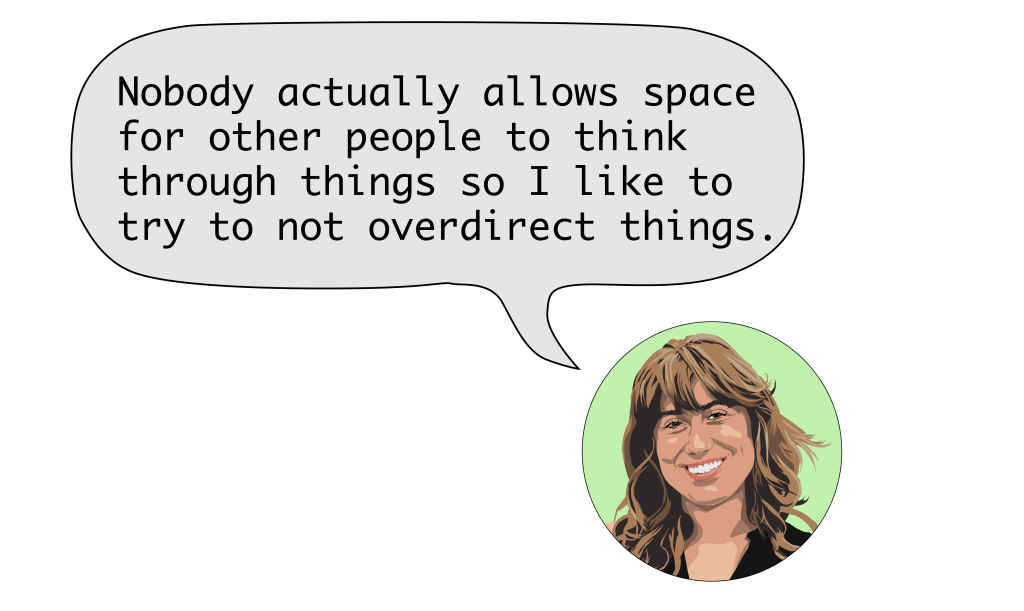Try out some of the tips below to help you build better relationships through your work!
- Listen: Ask follow up questions, use repetition to show you’re listening, and keep responding!
- Build Trust: Become a reliable presence in your community. Give people options for sharing with you and reflect back to them the importance of their unique knowledge and story.
- Find People to Talk with: Build off of the work that other community organizations are already doing rather than duplicating it, connect with people who are directly impacted by the issue you’re reporting on, and make the extra effort to represent the diversity of stakeholders.
- Stay Accountable: Be transparent, own up to mistakes, and if you can, keep in touch with people you meet through your reporting.
GUIDE SECTIONS:
Introduction
Building Relationships
Building Trust
Finding People
Staying Accountable
Tips On Listening
Tailor Your Interview Style to Different People
When Adriana was interviewing survivors of sexual assault, she made sure to check in with other reporters who had experience working with this population and they were able to share important tips that helped her be prepared. She says she learned that “folks don’t remember things linearly, like, they might talk about the end first, or they might call you back because something else came to mind that didn’t at all surface when you were talking to them.” So she made sure to give extra time and “air to breathe” during interviews, saying things like, “Hey, you don’t have to tell me everything in this conversation, I’m happy to call you again,” and reminding people to share in however much detail they were comfortable with.
Don’t Overdirect Things
Natalie says to “Ask a question and just don’t immediately rephrase because the person hasn’t immediately started speaking. I value the blank space while they perhaps collect their thoughts and the little bit of a gap at the end.” While Natalie was an adult education teacher, she remembers being trained on the ideal wait time after asking a question. She says the average teacher’s wait time is about 2 seconds, while the ideal wait time is 10 seconds.

Record Your Interviews
Listening well is a big enough job on its own, along with being ready to respond. Natalie says she always records her interview so she won’t have to worry if she caught everything.
Use Repetition and Follow Up Questions
“When it comes to listening to establish trust, for me, it’s always about repetition,” says Kavolshaia, “even just repeating their name.” She says you should be sure to go off-script from your pre-packaged questions to ask follow up questions about what they’re actually saying. She’s seen how follow up questions help people become more engaged in a conversation and drop their guard a bit.

Kavolshaia says follow up questions can also be crucial when you need a soundbite for an audio or video piece, because you’re more likely to have a few different phrases to choose from.
Listen by responding
Terry says if you’re not responding, you’re not listening, “So that is the quantification of listening is your ability to respond.” That means responding to emails and answering questions, but it also means recognizing things like when people show up to your meetings regularly, and telling them, “Hey, thank you for showing up regularly.”
Resources
- Learn from Free Press’s News Voices how to contact folks in your community and find out what information they need to stay safe, healthy, and connected during the COVID-19 pandemic in the Gather featured project ‘Rona Call: A Community-Info Phone Tree. You can find this and other related resources on Gather under the Dialogues topic.
- Read the Listening Post Collective’s Playbook section on Listening!
- Check out API’s primer on building audience and relevance by listening to and engaging your community!
* * Lightning Chat! * * Find more ways to connect with people from the What Does Local Mean chat!
GUIDE SECTIONS:
Introduction
Building Relationships
Building Trust
Finding People
Staying Accountable
